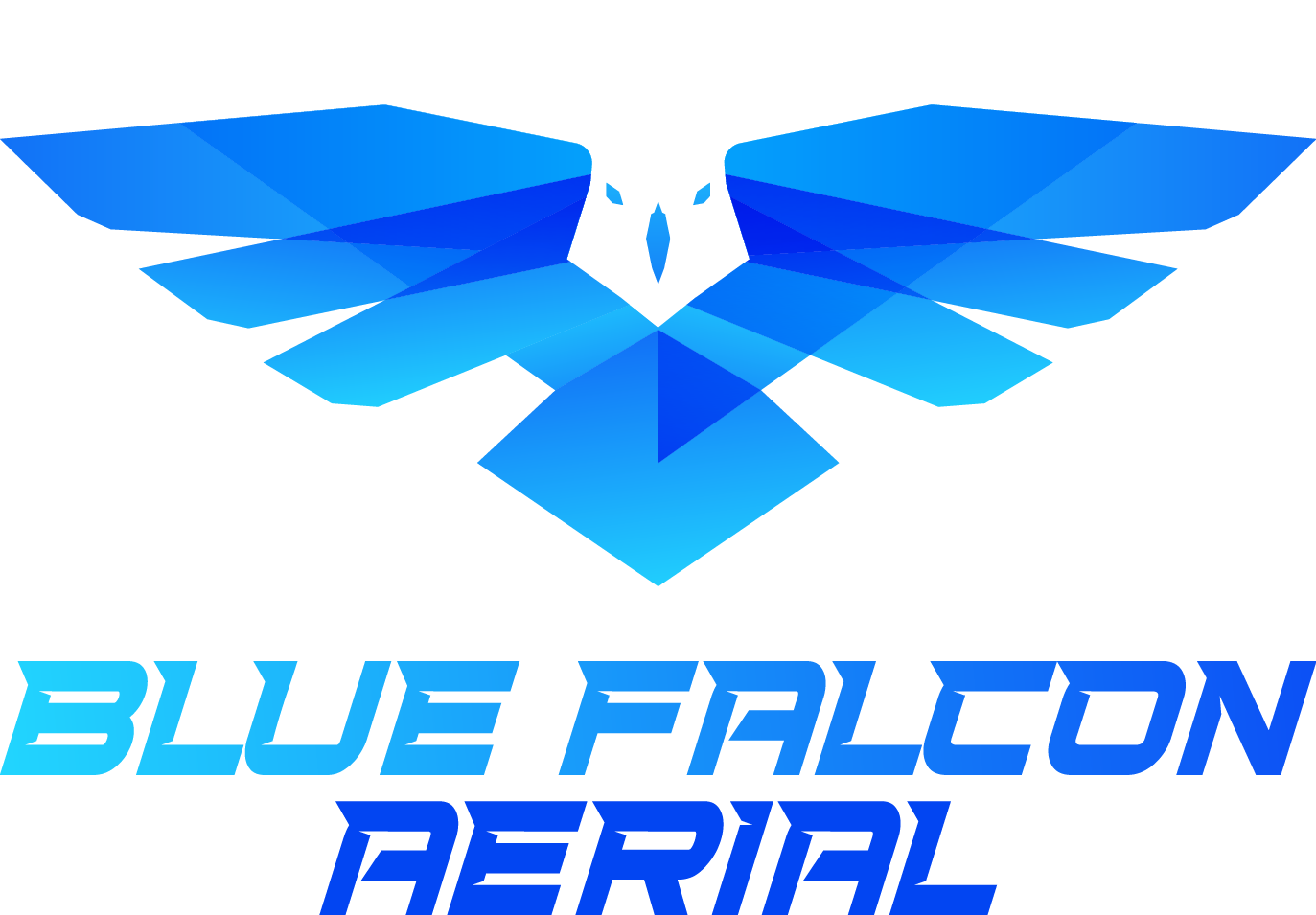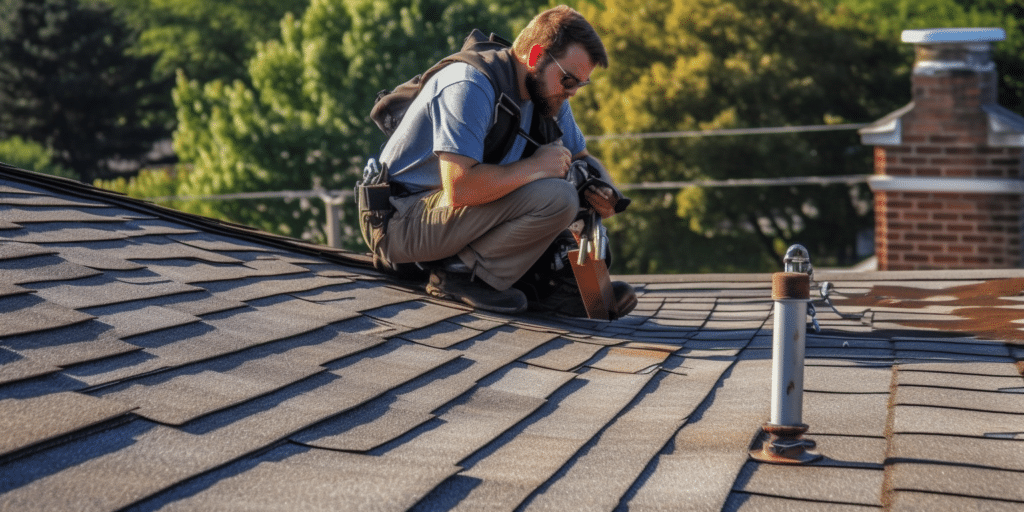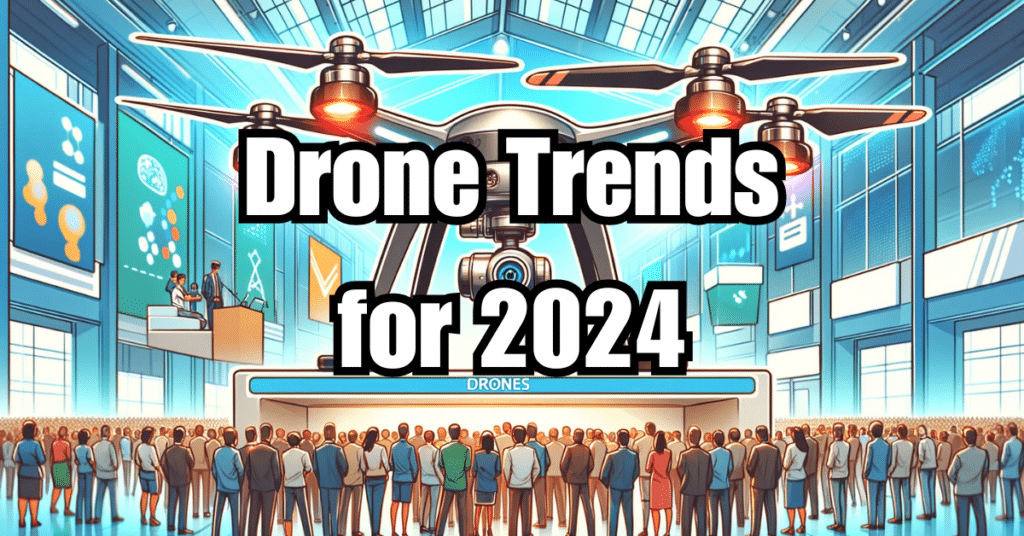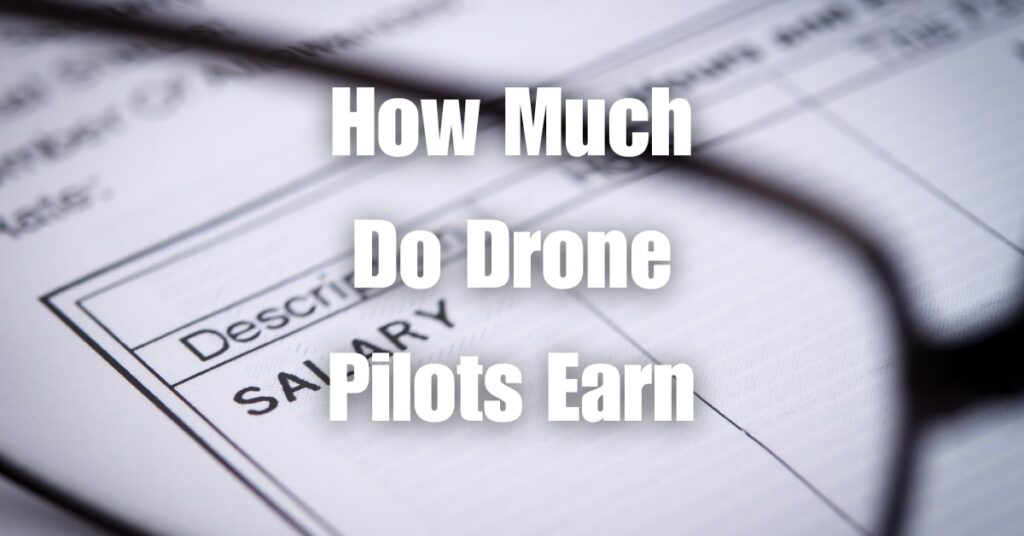The roofing industry has seen a revolution in recent years thanks to drone roof inspections. No longer do contractors need to scale dangerous heights or rely on outdated manual methods to inspect roofs. Drones have transformed the way roofers assess damage, estimate repair costs, and maintain customer relationships. By using high-resolution cameras, advanced GPS systems, and AI-powered software, drones have made roof inspections safer, faster, and more accurate.
In this guide, we’ll cover everything you need to know to master drone roof inspections—from selecting the right equipment to using advanced aerial survey techniques. Whether you’re new to drone technology or looking to refine your inspection process, this guide will help you streamline operations and enhance your service offerings.
Key Takeaways
- Drone roof inspections provide increased safety by reducing the need for manual rooftop inspections, allowing roofers to gather data from the ground without risking accidents.
- Drones allow for faster data collection, completing inspections in a fraction of the time compared to traditional methods, improving efficiency and reducing labor costs.
- With high-resolution imagery and AI-powered analysis, drone inspections offer enhanced accuracy, helping roofers identify issues like cracks, leaks, or missing shingles with precision.
- Preparing for drone roof inspections involves planning flight paths, checking weather conditions, and ensuring compliance with FAA regulations to guarantee safety and legality.
- Post-inspection data analysis using AI software helps generate detailed reports, allowing roofers to present findings clearly to clients and provide accurate repair estimates.
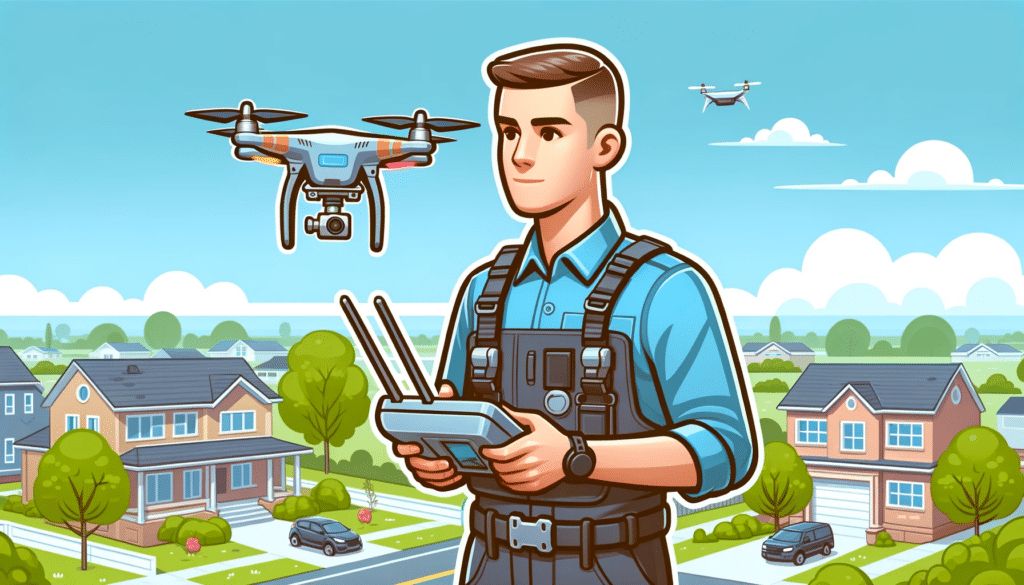
Safety: Keeping Roofers Off the Roof
One of the most significant advantages of drone roof inspections is the improvement in safety. Traditional roof inspections require roofers to physically climb onto roofs, often putting themselves at risk of falls, slips, or other accidents, especially when working on steep or damaged surfaces. Drones eliminate this risk by allowing roofers to perform comprehensive inspections from the ground. With the right drone, you can capture high-quality images of every part of the roof without needing to set foot on it.
By keeping roofers safe on the ground, drones help businesses reduce the chances of work-related injuries, lower insurance costs, and avoid potential delays caused by accidents. This increase in safety also improves the overall efficiency of operations, as inspections can be completed faster and without the need for safety gear or scaffolding.
| Benefit | Impact on Roofers |
|---|---|
| No need for manual access to roofs | Reduces the risk of accidents, falls, and injuries during inspections |
| Less time spent setting up safety gear | Increases efficiency and reduces inspection time |
| Fewer accidents | Lower insurance premiums and fewer delays caused by work-related injuries |
Faster, More Efficient Inspections
Time is money in the roofing industry, and drone roof inspections drastically reduce the time it takes to inspect a roof. Traditionally, roof inspections required significant time for setup, such as positioning ladders, installing safety gear, and manually walking the roof to check for damage. Drones streamline this process by capturing high-quality images and data within minutes. With drones, roofers can inspect large or complex roofs faster than ever, meaning more jobs can be completed in a single day.
Drones equipped with advanced cameras, like the Mavic 3 Enterprise, allow roofers to capture detailed images in real-time, ensuring that nothing is missed during the inspection. This efficiency doesn’t just speed up the inspection process; it also allows roofers to provide quicker feedback and reports to their clients, resulting in higher customer satisfaction and increased business potential.
| Efficiency Benefit | Impact on Business |
|---|---|
| Faster inspections | Reduces time spent on each job, allowing for more jobs to be completed per day |
| Real-time data capture | Provides immediate, high-quality images for quick analysis and reporting |
| Improved client satisfaction | Faster turnaround times lead to happier clients and repeat business |
Enhanced Accuracy with High-Resolution Imagery
Drone technology offers a significant boost in the accuracy of roof inspections. Equipped with high-resolution cameras like the Mavic 3 Enterprise’s 4/3 CMOS Camera, drones capture crisp, clear images that allow roofers to identify problems such as cracks, missing shingles, or leaks with far greater detail than traditional methods. The 4/3 CMOS camera sensor in the Mavic 3 Enterprise delivers larger, more detailed images, which are essential for detecting even the smallest signs of damage.
The 56x hybrid zoom feature on the Mavic 3 Enterprise allows roofers to inspect specific sections of the roof up close without needing to physically access dangerous or hard-to-reach areas. This ability to zoom in and capture fine details makes it easier to assess potential problems before they escalate into major issues. Whether it’s inspecting the integrity of individual shingles or checking for subtle cracks, this level of accuracy is crucial for delivering the best possible service to clients.
| Camera Feature | Benefit to Roof Inspections |
|---|---|
| 4/3 CMOS Camera | Provides high-resolution images with exceptional detail for accurate damage assessment |
| 56x hybrid zoom | Allows close-up inspections of specific areas without needing to climb the roof |
| Crisp, clear imagery | Improves identification of subtle roofing issues such as small cracks or leaks |
Essential Equipment for Drone Roof Inspections
Why the Mavic 3 Enterprise is the Best Choice
Selecting the right drone is critical for conducting successful drone roof inspections. Among the best choices for roofing professionals is the Mavic 3 Enterprise, which comes equipped with a powerful 4/3 CMOS Camera that delivers stunning 20MP resolution and a 56x hybrid zoom capability. These features make it the perfect tool for capturing high-quality imagery from both wide angles and close-up inspections. The Mavic 3 Enterprise’s 4/3 CMOS sensor allows for larger image sizes and greater detail, which are essential for identifying small cracks, leaks, or missing shingles that could otherwise go unnoticed.
In addition to the impressive camera, the Mavic 3 Enterprise is equipped with state-of-the-art stability and GPS capabilities. This ensures smooth flight, even in less-than-ideal weather conditions, and allows roofers to conduct inspections with precision. Another advantage of the Mavic 3 Enterprise is its long battery life, which ensures that even large or complex roofs can be fully inspected without needing to stop and recharge the drone.
| Mavic 3 Enterprise Feature | Benefit for Roof Inspections |
|---|---|
| 4/3 CMOS Camera | Delivers detailed, high-resolution images for accurate damage assessment |
| 56x hybrid zoom | Allows roofers to inspect specific areas of the roof up close without climbing |
| GPS capabilities | Provides stable, accurate flight for smooth and efficient inspections |
| Long battery life | Ensures large roofs can be inspected in a single flight without frequent recharging |
Using the Mavic 3 Thermal for Infrared Data
For roofers who need to go beyond visual inspections, the Mavic 3 Thermal offers a thermal imaging option that is invaluable for identifying hidden issues. While this drone does not feature the 4/3 CMOS camera found in the Mavic 3 Enterprise, it excels in producing infrared data, which can be critical for detecting moisture buildup, insulation problems, or heat loss that may not be visible with a standard camera.
The Mavic 3 Thermal provides the ability to conduct infrared and RGB (regular image) inspections simultaneously, giving roofers a comprehensive understanding of the roof’s condition. This is particularly useful in commercial roof inspections, where water pooling or insulation problems are more common. With the Mavic 3 Thermal, roofers can offer clients an additional layer of analysis, ensuring a more complete inspection and allowing for proactive maintenance recommendations.
| Mavic 3 Thermal Feature | Benefit for Infrared Inspections |
|---|---|
| Infrared imaging | Detects hidden moisture or insulation issues not visible with regular cameras |
| Simultaneous RGB and infrared | Allows for detailed, comprehensive inspections of both visible and hidden problems |
| Ideal for commercial properties | Provides essential data for larger roofs with potential insulation or moisture issues |
Regular Drone Maintenance for Optimal Performance
As with any valuable equipment, routine maintenance is crucial to ensure your drone performs at its best. Before each inspection, roofers should check the camera lens for dust or dirt, inspect the propellers for any signs of wear, and ensure the battery is fully charged. Keeping the drone’s software and firmware up to date is also essential to make sure you have access to the latest features and improvements.
Proper maintenance not only extends the life of your drone but also ensures that every inspection delivers the high-quality images and data that clients expect. By keeping your drone in peak condition, you can maximize its effectiveness and avoid costly repairs or replacements.
| Maintenance Task | Benefit to Drone Performance |
|---|---|
| Clean camera lens | Ensures clear, high-quality images during inspections |
| Inspect propellers | Prevents flight disruptions and ensures safe, smooth operation |
| Keep software updated | Access to new features and improvements for better inspection performance |
| Monitor battery health | Ensures long flight times and avoids mid-inspection power failures |
By investing in the Mavic 3 Enterprise or the Mavic 3 Thermal, roofers can take their inspections to the next level, offering clients detailed, accurate, and comprehensive assessments that enhance the overall quality of their service. With the right drone and proper maintenance, roofing professionals can achieve safer, faster, and more efficient inspections than ever before.
Preparing for a Drone Roof Inspection
Pre-Inspection Planning and Site Surveys
Before conducting any drone roof inspection, proper preparation is essential to ensure both safety and efficiency. The first step is to plan the inspection by assessing the site conditions. This includes reviewing the roof’s structure, identifying any obstacles such as trees or chimneys, and determining the best flight path for the drone. A pre-inspection survey can help roofers identify potential hazards that might affect the flight, such as power lines or nearby structures.
Weather plays a significant role in drone inspections. Checking the forecast before the flight is crucial to avoid poor visibility, strong winds, or rain, all of which can compromise both the quality of the data captured and the safety of the drone. For instance, wind gusts can destabilize the drone, leading to blurry images, while rain can damage the equipment. Always ensure that the flight conditions are optimal for a successful inspection.
| Pre-Inspection Task | Importance |
|---|---|
| Site survey and hazard identification | Helps avoid obstacles like trees or power lines, ensuring safe drone operation |
| Weather check | Prevents drone instability and poor image quality due to bad weather conditions |
| Flight path planning | Ensures the entire roof is inspected efficiently without missing key areas |
Compliance with FAA Regulations and Safety Guidelines
Drone operators must comply with FAA regulations when conducting roof inspections. This includes ensuring that the drone is registered with the FAA and that the operator holds the appropriate certification, such as the Part 107 remote pilot certification. It is also essential to ensure that the flight remains within visual line of sight (VLOS) at all times, meaning the drone must be visible to the operator during the inspection.
In addition to federal regulations, it is critical to follow safety protocols. This includes maintaining a safe distance from people and structures, using pre-set geofencing to keep the drone within a designated area, and ensuring that the drone’s software is up to date. Safety should always be the top priority during any drone inspection, and following these guidelines will ensure smooth, legal, and risk-free operations.
| Regulation/Guideline | Reason for Compliance |
|---|---|
| FAA registration | Ensures that the drone is legally recognized for commercial use |
| Part 107 remote pilot certification | Required for legal operation of drones in commercial settings |
| Visual line of sight (VLOS) | Ensures that the operator maintains full control and visibility of the drone |
| Geofencing | Keeps the drone within the designated area and prevents accidental flight into restricted zones |
Conducting a Drone Roof Inspection
Step-by-Step Guide to Performing a Drone Roof Inspection
Executing a successful drone roof inspection requires a methodical approach to capture high-quality, useful data. Once the drone is in the air, the first step is to fly over the entire roof and take a wide-angle overview of the roof’s condition. Drones like the Mavic 3 Enterprise can capture high-resolution images of the roof in a matter of minutes, providing a clear picture of the overall state of the roof and identifying any obvious damage.
Next, focus on capturing detailed shots of key areas, especially those prone to damage, such as roof valleys, vents, skylights, and chimneys. Use the 56x hybrid zoom feature of the Mavic 3 Enterprise to zoom in and inspect specific areas without compromising safety. This close-up inspection will allow you to spot smaller issues like cracks, missing shingles, or leaks.
For more detailed assessments, take advantage of the drone’s ability to capture images from multiple angles and perspectives. This ensures that no part of the roof goes unexamined. If equipped with thermal imaging, as found on the Mavic 3 Thermal, capture infrared data to detect hidden moisture buildup or insulation problems.
| Inspection Step | Best Practice |
|---|---|
| Wide-angle overview | Capture high-resolution images of the entire roof for an overall assessment |
| Detailed close-up shots | Use the hybrid zoom to inspect specific areas like roof valleys or chimneys |
| Capture images from multiple angles | Ensures no part of the roof is missed, increasing the accuracy of the inspection |
| Thermal imaging (if available) | Detect hidden issues like moisture or insulation problems |
Identifying Common Roofing Issues
Once you’ve gathered high-quality images using the drone, the next step is to analyze the data and identify any issues with the roof. Common problems to look for during a drone roof inspection include:
- Cracked or missing shingles: These are often the first signs of wear and tear and can lead to leaks if not addressed.
- Roofing valleys: Water tends to pool in roof valleys, making them a common site for damage. Drone imagery can help identify any water buildup or deterioration in these areas.
- Flashing damage: Flashing around chimneys, vents, or skylights is prone to corrosion or detachment. High-resolution drone images can capture any deterioration.
- Gutter issues: Clogged or damaged gutters can lead to water overflow, causing roof and foundation damage. Use the drone to check the condition of the gutters as part of the inspection.
Drones equipped with thermal imaging provide additional insights, especially for identifying hidden issues like moisture infiltration or heat loss. These problems are often invisible to the naked eye but can be detected through temperature variations picked up by infrared sensors. The Mavic 3 Thermal allows for a side-by-side comparison of standard and thermal images, making it easy to diagnose hidden issues alongside visible problems.
| Common Roofing Issue | How Drone Inspection Helps |
|---|---|
| Cracked or missing shingles | High-resolution imagery captures even small cracks or missing shingles |
| Roofing valleys | Drone imagery shows water pooling or damage in these critical areas |
| Flashing damage | Captures close-up details of flashing around chimneys, vents, and skylights |
| Gutter problems | Helps spot clogs or damage that could lead to roof and water drainage issues |
| Moisture buildup (with thermal imaging) | Detects moisture infiltration that could lead to long-term structural damage |
By following a structured process for drone roof inspections and utilizing high-quality drone features, such as the Mavic 3 Enterprise’s zoom capabilities and the Mavic 3 Thermal’s infrared imaging, roofers can provide accurate, thorough assessments for their clients. These tools not only improve efficiency but also enhance the quality of the inspection, ensuring that potential problems are identified early and addressed promptly.
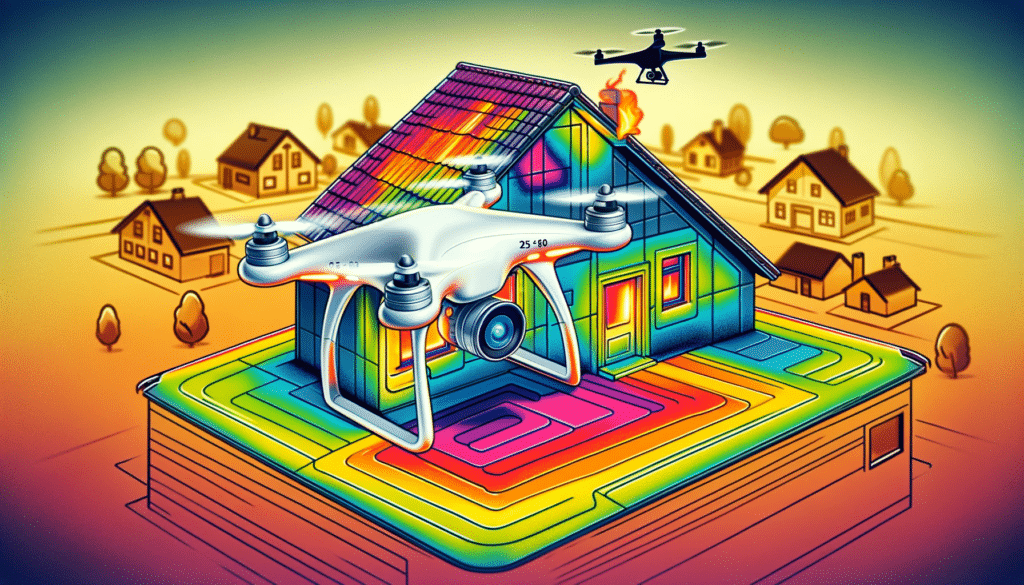
Post-Inspection Data Analysis
Processing Drone-Captured Data
After conducting a drone roof inspection, the next crucial step is data processing. The images and videos captured by the drone, especially with the high-resolution capabilities of the Mavic 3 Enterprise, provide valuable information that can be transformed into detailed reports. To maximize the usefulness of this data, it is essential to use software designed for roof inspection analysis. Programs such as Pix4D, DroneDeploy, or DJI Terra allow roofers to stitch images together to create a comprehensive map of the roof or generate a detailed 3D model.
The goal is to compile all the captured images into a cohesive visual presentation that highlights problem areas, ensuring nothing is missed. These software tools can also analyze data to detect structural issues or degradation, especially when AI-powered algorithms are involved. This automates part of the process and reduces the risk of human error. For example, AI can help detect subtle signs of roof wear, such as small cracks or granules wearing off shingles, which might be overlooked during a manual review.
| Data Processing Tool | How It Helps Roof Inspections |
|---|---|
| Pix4D | Converts drone imagery into detailed 2D maps and 3D models for easy analysis |
| DroneDeploy | Analyzes captured images, identifies issues, and generates actionable reports |
| DJI Terra | Offers precise mapping and data analytics for accurate, efficient roof assessments |
| AI-Powered Algorithms | Automates detection of subtle damage, improving accuracy and saving time |
Generating Reports for Clients
Once the data has been processed, it’s time to turn those insights into actionable reports that can be shared with clients. Reports should include an overview of the roof’s condition, highlighting any problem areas and providing visual evidence of damage or wear. High-resolution images captured by the Mavic 3 Enterprise’s 4/3 CMOS Camera are ideal for this, as they give clients a clear view of the issues that need attention.
For clients who may not be familiar with technical roofing terms, it’s helpful to include annotations on the images to clearly mark areas of concern. Many software tools allow you to add these annotations directly to the report, making it easier for clients to understand the situation. If thermal imaging was used, such as with the Mavic 3 Thermal, include infrared data in the report to show potential moisture problems or insulation issues that may not be visible in standard images.
The final report should be professional and comprehensive, detailing recommended repairs and offering estimates for future maintenance. By providing such a detailed and clear report, roofers can help clients make informed decisions while building trust and confidence in the service.
| Report Element | Purpose |
|---|---|
| High-resolution images | Provides clients with a clear view of roof damage and areas that need attention |
| Annotations and labels | Makes it easy for clients to identify problem areas on the roof |
| Infrared data (if applicable) | Shows hidden issues like moisture buildup or insulation problems |
| Repair recommendations | Helps clients understand what needs to be fixed and why |
| Maintenance estimates | Encourages clients to plan for future upkeep and prevents further damage |
Storm Damage Assessments and Drone Technology
How Drones Help with Storm Damage Inspections
Storm damage can be severe and often requires immediate attention. Using drones for storm damage assessments allows roofers to quickly evaluate the extent of damage without waiting for clear weather or safe conditions to access the roof manually. Drones like the Mavic 3 Enterprise can be deployed immediately after a storm, capturing high-resolution imagery of damaged areas, such as missing shingles, roof punctures, or debris buildup.
One of the primary benefits of using drones for storm assessments is the speed at which inspections can be conducted. Roofers can perform multiple inspections in a single day, enabling them to provide fast, accurate reports to clients or insurance companies. This rapid response is essential when dealing with storm damage claims, as homeowners and insurers are often eager to resolve these issues quickly.
Moreover, drones equipped with thermal imaging, like the Mavic 3 Thermal, can detect hidden issues caused by storms, such as water infiltration, that may not be immediately visible. The ability to see beyond the surface allows roofers to provide more comprehensive storm damage reports and recommend appropriate repairs or preventive measures.
| Storm Damage Inspection Benefit | How Drones Improve the Process |
|---|---|
| Fast, efficient inspections | Allows roofers to assess damage quickly and provide immediate feedback |
| High-resolution images | Captures detailed photos of visible damage, helping to expedite repair decisions |
| Thermal imaging (if available) | Detects hidden moisture or structural issues caused by the storm |
| Immediate deployment after a storm | No need to wait for safe conditions or set up traditional inspection equipment |
Streamlining the Insurance Claims Process
For many homeowners, filing insurance claims for storm damage can be a daunting process. Drones simplify this by providing detailed, timestamped evidence of the damage, which insurers require to validate claims. High-resolution images, alongside infrared data (when applicable), can show the extent of the damage in a way that traditional inspections cannot, leading to quicker claim approvals.
By providing a comprehensive report with clear images and data, roofers can help homeowners submit insurance claims with confidence. The faster an insurance claim is processed, the sooner repairs can begin, and the more satisfied the client will be. Some drone software platforms even allow for direct integration with insurance systems, speeding up the submission process and ensuring that all necessary data is captured and formatted correctly.
| Insurance Claim Support | How Drones Improve the Claims Process |
|---|---|
| Timestamped evidence | Provides insurers with clear proof of when the damage occurred |
| Detailed damage assessment | Helps homeowners submit complete, accurate claims that are more likely to be approved |
| Infrared data (if applicable) | Adds another layer of evidence for hidden damage, increasing claim validity |
| Integration with insurance systems | Speeds up claim submission and processing, reducing wait times for homeowners |
Reassessments After Repairs or Additional Storms
Drones don’t just help with initial storm damage inspections—they’re also invaluable for reassessments. After repairs have been completed, roofers can use drones to verify the quality of the work and ensure that the roof is in excellent condition. This is especially important for homeowners and insurance companies, as it provides peace of mind that the roof is now secure and future storms will be less likely to cause severe damage.
Additionally, in areas prone to frequent storms, drones can be used to reassess the roof after each major weather event. This proactive approach ensures that any new damage is caught early, preventing further deterioration and avoiding costly repairs down the line. The ability to perform quick, efficient reassessments with drones keeps roofers engaged with their clients and positions them as reliable, long-term partners in maintaining the roof’s integrity.
| Reassessment Benefit | How Drones Help |
|---|---|
| Verifies quality of repairs | Provides clients and insurers with proof that repairs were completed successfully |
| Early detection of new damage | Allows roofers to catch any issues caused by subsequent storms |
| Increases client trust | Positions the roofer as a proactive partner in the maintenance of the roof |
| Efficient, repeat inspections | Drones enable fast, thorough reassessments without the need for manual inspections |
Using drones for storm damage assessments not only streamlines the inspection process but also strengthens the relationship between roofers, homeowners, and insurance providers. By offering comprehensive, data-driven reports and reassessments, roofers can provide peace of mind while maintaining a competitive edge in the market.
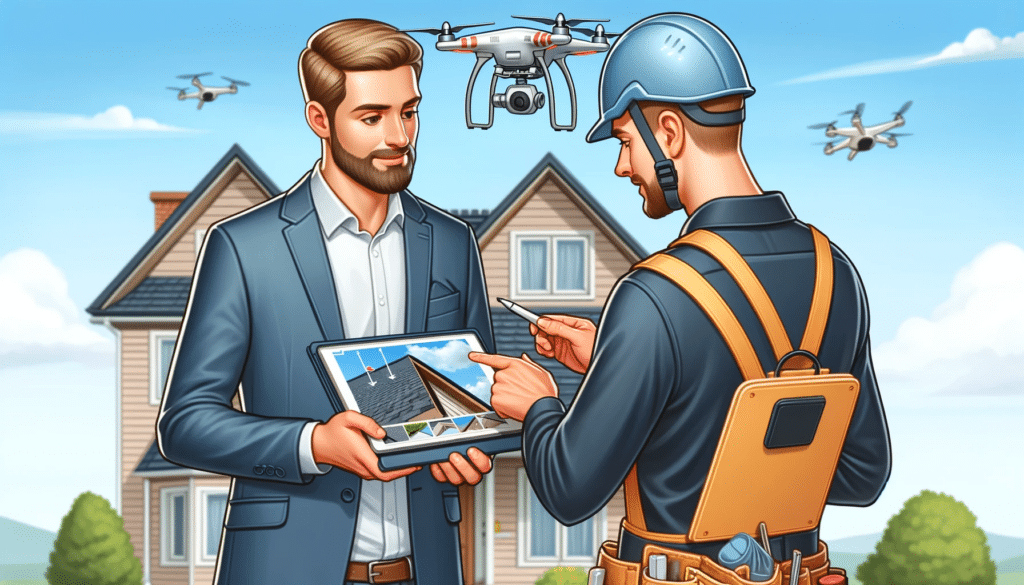
The Future of Drone Roof Inspections
Emerging Trends in Drone Technology for Roofing
The future of drone roof inspections is evolving rapidly as new technology continues to push the boundaries of what is possible in the roofing industry. One of the most exciting developments is the integration of AI and machine learning into drone software. These technologies allow drones to not only capture images but also analyze them in real time, identifying potential issues such as roof damage, heat loss, or water pooling without needing manual review.
As AI becomes more advanced, it will reduce the time and effort required for roofers to assess the data collected by drones. This means that in the near future, drones may be able to autonomously inspect roofs and generate reports with minimal human intervention. This can lead to faster turnaround times, greater efficiency, and improved accuracy in identifying roof problems.
Another trend is the improvement of battery technology. With longer-lasting batteries, drones will be able to conduct more extended and comprehensive inspections in a single flight, even on large commercial buildings. This improvement will further reduce downtime and increase the number of jobs a roofing company can handle per day.
| Emerging Trend | Impact on Drone Roof Inspections |
|---|---|
| AI and machine learning integration | Allows drones to automatically identify and report roof damage |
| Battery advancements | Increases flight duration, enabling more comprehensive inspections |
| Autonomous inspections | Reduces the need for human intervention, speeding up the inspection process |
AI and Machine Learning in Roof Inspections
The incorporation of AI and machine learning into drone inspections is set to revolutionize the way roofers work. Currently, drone inspections provide high-quality images that need to be reviewed by a person. However, AI-powered software is now able to analyze this data in real time, flagging areas of concern such as damaged shingles, cracks, or even signs of moisture accumulation that would otherwise require additional tools or manual review.
With this technology, roofers will be able to automate the analysis process, allowing them to focus on client interaction and repair recommendations rather than spending hours reviewing images. As AI technology improves, its accuracy in identifying even the most subtle signs of roof degradation will continue to enhance the precision and reliability of drone inspections.
| AI Benefit | How It Improves Roof Inspections |
|---|---|
| Real-time data analysis | Automatically flags potential issues during the flight, speeding up inspections |
| Improved accuracy | Reduces human error and ensures no signs of roof damage are overlooked |
| Time-saving | Allows roofers to focus on delivering results to clients faster |
Drones and Sustainability in Roofing
In addition to efficiency, drones are playing a role in promoting sustainability within the roofing industry. By reducing the need for multiple site visits and minimizing the need for heavy equipment, drones decrease the carbon footprint associated with traditional roofing inspections. Fewer vehicles on the road and reduced time on-site mean less energy consumption and lower emissions.
Moreover, drones equipped with thermal imaging can help identify areas where homes or buildings are losing energy through their roofs. This data allows roofers to make informed recommendations about improving energy efficiency, contributing to more sustainable building practices. As sustainability becomes a growing concern for homeowners and businesses alike, drones provide a powerful tool for addressing these issues.
| Sustainability Feature | Benefit for the Roofing Industry |
|---|---|
| Fewer site visits | Reduces carbon emissions and energy consumption from travel and heavy equipment |
| Thermal imaging | Helps identify energy inefficiencies, promoting sustainable roofing practices |
| Faster inspections | Minimizes time spent on-site, leading to more eco-friendly operations |
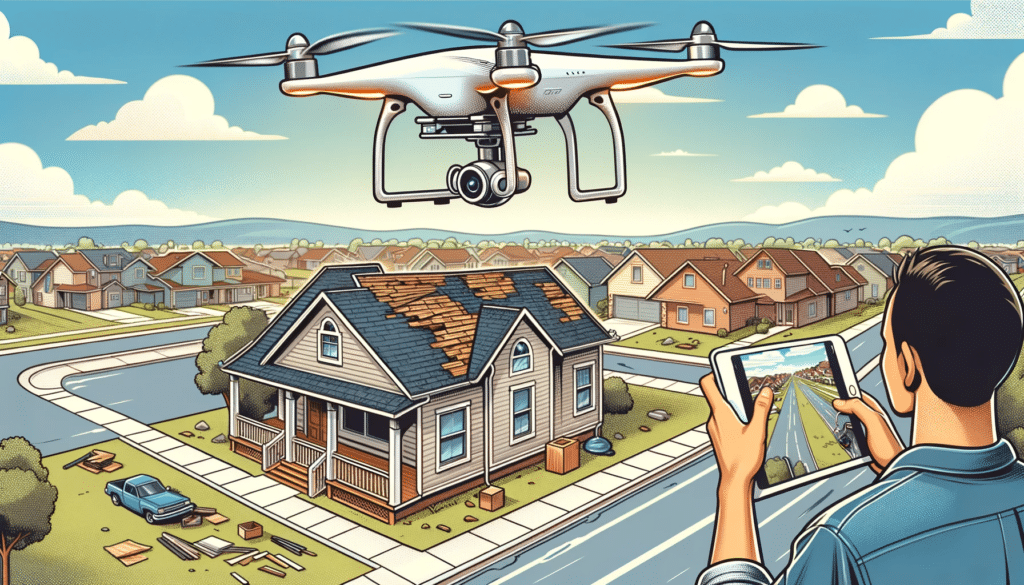
Joining a Nationwide Drone Pilot Network for Roof Inspections
If you’re a drone pilot looking to specialize in roof inspections, joining a dedicated pilot network can provide a fantastic opportunity to grow your business while working with cutting-edge technology. The Blue Falcon Aerial Nationwide Pilot Network is designed specifically for pilots who want to focus on roofing inspections, offering unique advantages that set it apart from other networks.
Why Pilots Should Join Our Nationwide Network
Zero Cost to Join
One of the greatest benefits of joining the Blue Falcon Aerial Pilot Network is that there are no upfront costs to participate. This allows you to build your drone inspection business without the financial burden of entry fees or subscription costs. You can get started right away and begin generating revenue without having to make an initial investment.
Flexible Work Schedule
As part of our network, you have complete control over your work schedule. This flexibility is perfect for those who want to balance drone operations with other commitments or take advantage of part-time opportunities. Whether you’re looking to expand your current business or simply earn extra income, you can work at your own pace and choose the hours that fit best for you.
Extensive Support and Training
We believe that your success is our success. That’s why we offer comprehensive training and support to all pilots in our network. You’ll have access to resources that cover the latest in drone technology, AI-powered roof assessments, and marketing strategies to help you effectively grow your business. You’re never alone; you’ll have a team of experts and a community of fellow pilots to help you succeed.
| Benefit | How It Helps You |
|---|---|
| Zero cost to join | Start building your business without financial barriers |
| Flexible work schedule | Freedom to choose your own hours and balance work with other commitments |
| Training and support | Receive ongoing support and access to training on technology and business growth |
Lucrative Revenue Share Model
Our network offers a lucrative revenue share model that rewards your efforts. Unlike traditional pilot networks that may offer limited payouts, our structure is designed to help you earn significantly more based on the value you bring to the table. As you complete more inspections, your earnings will grow accordingly, providing a strong financial incentive to continue building your business through our platform.
This model ensures that the more effort you put in, the greater your rewards will be. Whether you want to scale up to a full-time drone inspection business or keep things part-time, the earning potential is in your hands.
| Revenue Share Model | How It Works |
|---|---|
| Performance-based earnings | The more inspections you complete, the more you earn |
| Greater earning potential | Allows you to earn more compared to traditional pilot networks |
| Scalable income | Supports both part-time and full-time business growth |
Cutting-Edge Technology and AI Tools
In the fast-evolving world of drone technology, staying ahead of the curve is critical. By joining the Blue Falcon Aerial Pilot Network, you’ll have access to the latest drone and AI-powered tools for roof inspections. Our network works with top-tier technology, such as the Mavic 3 Enterprise, which features a 4/3 CMOS camera and hybrid zoom capabilities, as well as the Mavic 3 Thermal for infrared data capture. Using these tools not only enhances your skills but also provides higher-quality data to clients, making your services more valuable.
In addition to high-end drones, our network integrates AI tools that automate the analysis of roof data, identifying damage, and generating detailed reports in less time. This technology simplifies your work, allowing you to complete more inspections efficiently and with greater precision.
| Technology Feature | How It Benefits You |
|---|---|
| Access to top-tier drones | Use the latest technology to deliver high-quality inspections |
| AI-powered tools | Automate data analysis and reporting, increasing efficiency |
| Mavic 3 Enterprise and Thermal | Work with industry-leading drones to capture precise visual and thermal data |
A Supportive Community of Professionals
Joining the Blue Falcon Aerial Pilot Network means becoming part of a collaborative community of professionals who are committed to raising the standards of the drone and roofing industry. Whether you’re new to roof inspections or an experienced pilot, you’ll have the opportunity to learn from others, share insights, and gain knowledge that will help you improve your business.
This sense of community not only fosters growth but also provides valuable networking opportunities. You’ll have access to a nationwide network of professionals who are all working toward the same goal—delivering quality roof inspections that help homeowners and businesses alike.
| Community Benefit | Why It’s Important |
|---|---|
| Collaboration with fellow pilots | Learn from others, share experiences, and build your business with expert insights |
| Nationwide network | Join a broad group of professionals committed to raising industry standards |
| Ongoing support and advice | Continuous access to advice and resources from other pilots and industry leaders |
Growth Opportunities
Whether you want to start small or scale up to a full-fledged business, the Blue Falcon Aerial Pilot Network offers the flexibility to meet your goals. With a flexible work schedule, cutting-edge technology, and comprehensive support, you can grow your business at your own pace. Some pilots may choose to operate part-time, while others can use this opportunity to build a thriving business offering drone roof inspections across multiple regions.
As you gain experience and build your reputation within the network, you’ll have the chance to take on more jobs and expand your service offerings, all while maintaining the freedom to work on your terms.
| Growth Opportunity | How It Helps You Scale |
|---|---|
| Flexible scaling | Operate part-time or scale up to a full-time business based on your goals |
| Access to more jobs | As you build your reputation, you’ll have the opportunity to take on more inspections |
| Freedom to grow at your pace | You decide how quickly you want to expand your business |
Ready to Join the Network?
The Blue Falcon Aerial Pilot Network is the perfect opportunity for drone pilots looking to specialize in roof inspections. With zero upfront costs, access to cutting-edge technology, and comprehensive support, you’ll have everything you need to build a successful business in the fast-growing field of drone inspections.
If you’re ready to take your drone career to the next level and join a nationwide community of professionals, visit the Blue Falcon Aerial Pilot Network to learn more and sign up today.
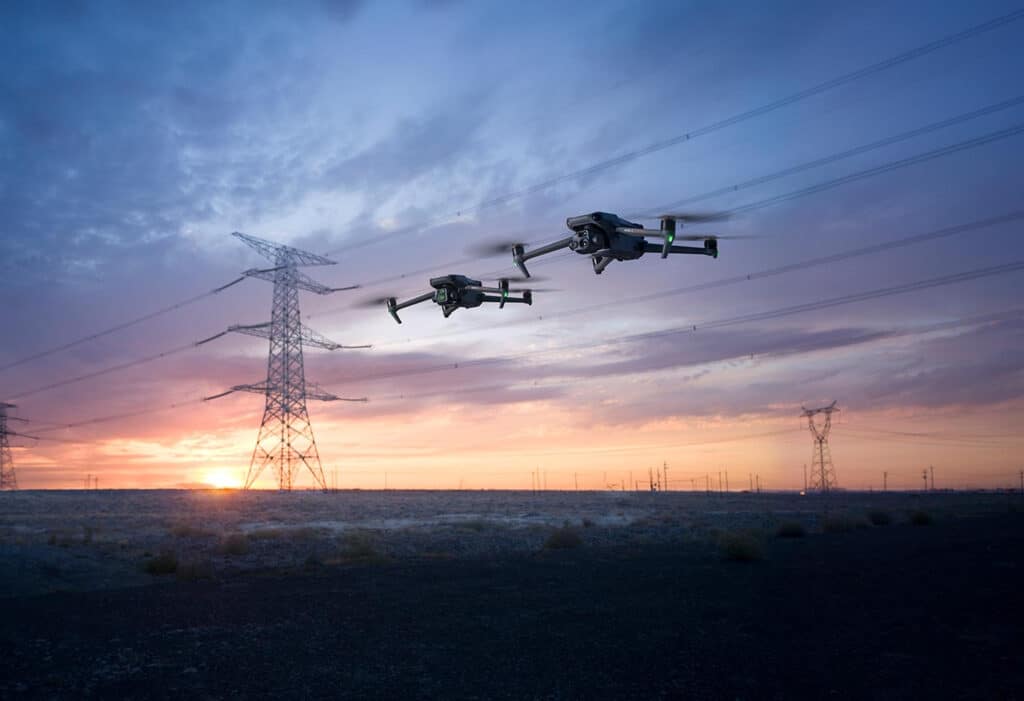
Why Roofers Should Join Our Ethical Roofer Network
As a roofing professional, joining the Blue Falcon Aerial Ethical Roofer Network provides you with a unique opportunity to grow your business, improve efficiency, and ensure long-term success. Our network is designed to connect you with qualified, exclusive leads while offering cutting-edge technology and support to help you deliver the best service possible to your clients.
Exclusive, Qualified Leads
One of the key advantages of joining our network is access to exclusive, qualified leads. Each lead you receive is unique to you, meaning you won’t have to compete with other roofers for the same client. Homeowners are pre-vetted, with drone assessments already completed by our team. This means they are ready to move forward with repairs or installations, leading to a much higher conversion rate.
This exclusivity helps you maximize your time and resources by focusing on clients who are prepared to act, rather than chasing after cold leads. With our system, you’ll be able to close more deals and grow your business faster.
| Lead Feature | Benefit to Roofers |
|---|---|
| Exclusive leads | No competition with other roofers for the same client, ensuring higher conversion rates |
| Pre-vetted homeowners | Homeowners have already had drone assessments and are ready for roof repairs |
| Higher lead quality | Focus on clients who are serious about moving forward, saving time and resources |
No Upfront Costs
Our program is entirely risk-free. There are no upfront costs to join, meaning you don’t pay a penny until a lead converts into a closed contract and installation. This ensures that you’re only paying for productive leads, eliminating the financial risk associated with traditional lead generation programs. You’ll never waste money on leads that don’t pan out.
By joining our network, you can scale your business without having to worry about wasting your marketing budget on unqualified or cold leads. You’ll only pay for successful results, aligning our interests with yours.
| No Upfront Cost Feature | Benefit to Roofers |
|---|---|
| Pay only for successful leads | No financial risk—only pay when a lead turns into a closed contract |
| Risk-free scaling | Allows you to grow your business without financial pressure or wasted budget |
Comprehensive Marketing Support
We know that marketing your roofing business can be time-consuming and expensive. That’s why we offer comprehensive marketing support as part of our program. Our team creates in-depth articles that showcase your business’s values, ethics, and quality, boosting your credibility with potential clients. These articles can be shared across your social media channels and on your website, further strengthening your online presence.
In addition, we promote your business through our network, ensuring that homeowners see you as a trusted provider. Our marketing efforts are designed to increase your visibility and attract clients who value professionalism and high standards.
| Marketing Feature | How It Helps Your Business |
|---|---|
| In-depth business articles | Promotes your business as an ethical, trusted roofer |
| Shared across multiple platforms | Boosts online presence, credibility, and client trust |
| Increased visibility | Helps attract more clients who are looking for reputable roofing services |
Automated Client Management
Maintaining long-term relationships with clients is crucial for the sustainability of your business, but it can be difficult to manage client follow-ups while focusing on new projects. That’s where our automated client management system comes in. We handle the follow-ups and reassessments for you, using drone technology to perform yearly roof assessments and keep clients engaged.
Our system helps secure repeat business by reminding clients when it’s time for a roof check-up or reassessment, ensuring that you stay connected with them without needing to dedicate extra time or resources. This automated follow-up system allows you to focus on growing your business while we manage ongoing client relationships.
| Client Management Feature | How It Helps Roofers |
|---|---|
| Automated follow-ups | Keeps clients engaged and ensures repeat business with minimal effort |
| Yearly drone assessments | Maintains long-term relationships by providing regular roof assessments |
| No additional effort required | You focus on new business, while we handle existing client management |
Cutting-Edge Drone Technology and AI-Powered Assessments
By joining our network, you’ll gain access to cutting-edge drone technology and AI-powered assessments. Our state-of-the-art drones provide high-resolution roof inspections that deliver accurate, detailed reports trusted by both homeowners and insurance companies. This technology ensures that your assessments are efficient and reliable, helping you close more deals.
Our drone and AI technology also improves the speed and precision of your work, allowing you to complete assessments faster and more accurately. With this advanced toolset, you’ll be able to offer higher-quality services to your clients, setting you apart from your competitors.
| Technology Feature | Benefit to Your Business |
|---|---|
| High-resolution drone inspections | Provides detailed, accurate reports for clients and insurers |
| AI-powered assessments | Speeds up the process, delivering reliable data quickly and efficiently |
| Enhances service quality | Allows you to offer better, more precise roofing services |
Storm-Tracking and Reassessments
Our system includes automatic storm tracking and reassessments, ensuring that you stay in touch with your clients after severe weather events. When a storm hits, we track its activity and perform reassessments on roofs that may have been affected. If new damage is detected, we reintroduce the client to you with updated reports, making it easier for you to secure repair jobs quickly and efficiently.
By offering this proactive service, you’ll not only build stronger relationships with your clients but also increase the number of jobs you can complete. Our system allows you to stay ahead of the competition by reaching clients before they even start searching for another roofer.
| Storm-Tracking Feature | How It Helps You Grow |
|---|---|
| Automatic storm tracking | Ensures you stay connected with clients after severe weather |
| Reintroduces clients with damage | Helps secure repair jobs quickly with updated assessments |
| Proactive service | Positions you as a reliable, attentive roofer who monitors client needs |
Ready to Join the Network?
The Blue Falcon Aerial Ethical Roofer Network offers an unmatched opportunity for roofers to grow their businesses with exclusive leads, cutting-edge technology, and comprehensive support. By joining, you’ll enjoy all the benefits of automated client management, high-quality drone assessments, and a system that’s entirely aligned with your success—with no upfront costs.
If you’re ready to take your roofing business to the next level and become part of a network that helps you focus on what matters most, visit the Blue Falcon Aerial Ethical Roofer Network to learn more and get started today.
Joining the Blue Falcon Aerial Nationwide Networks—whether as a drone pilot or a roofer—provides unmatched opportunities to grow your business with cutting-edge technology, comprehensive support, and access to exclusive, qualified leads. By leveraging advanced drone inspections, AI-powered data analysis, and automated client management systems, both pilots and roofers can streamline their operations, improve efficiency, and build long-term, sustainable relationships with their clients.
With no upfront costs, flexible work schedules, and revenue models designed to maximize your earnings, the Blue Falcon Aerial Network is built to ensure that your success is our success. Whether you’re a pilot looking to join a thriving community or a roofer seeking to expand your business with better leads and superior tools, this network offers everything you need to stay ahead of the competition.
Ready to take the next step? If you’re a roofer, visit the Blue Falcon Aerial Ethical Roofer Network, or if you’re a drone pilot, check out our Pilot Network. Let’s build the future of roofing together!
